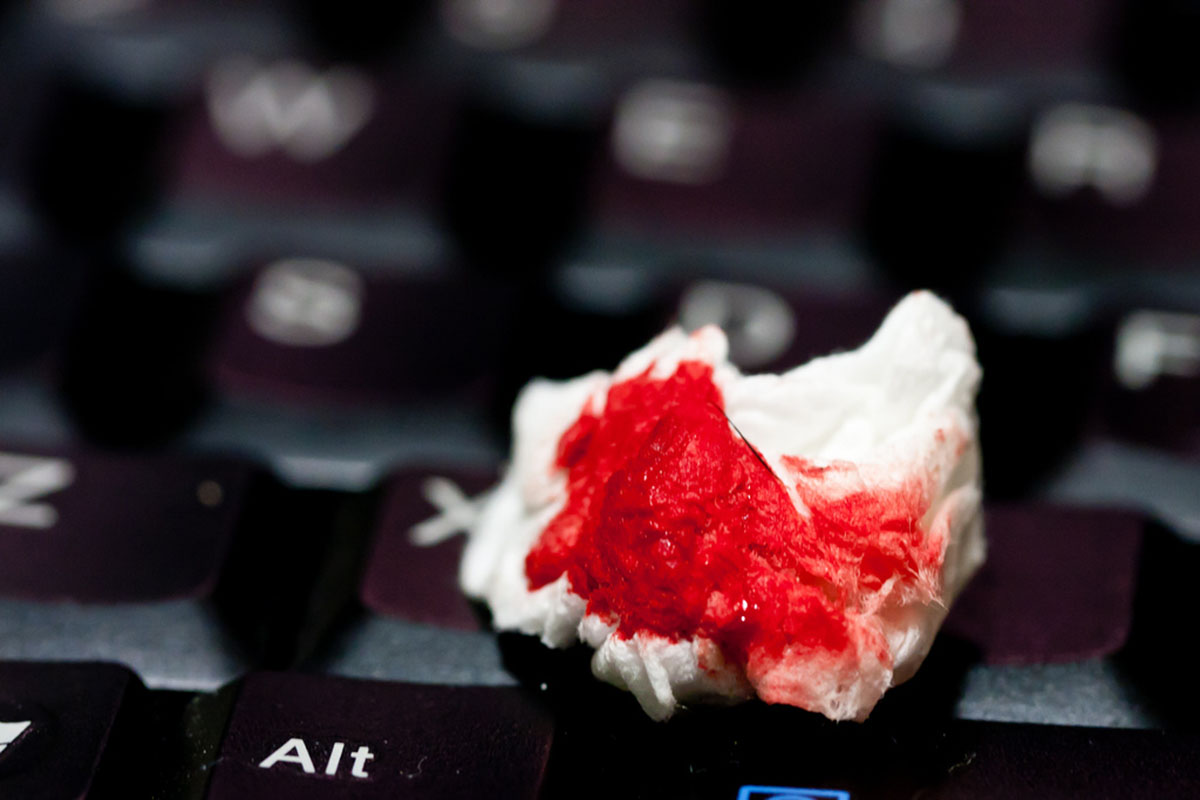Table of Contents
A nosebleed every once in a while is not a reason to see your family doctor, if the nosebleed stops within around 15 minutes after following the instructions we gave. There are circumstances in which a nosebleed should worry you enough to seek medical attention, however. These can be divided into two categories: nosebleeds that require you to go to hospital, and nosebleeds that should lead you to see your family doctor.

In the meantime, for minor nosebleeds at home, you can do the following:
- Sit up straight and lean slightly forward to prevent blood from flowing down your throat.
- Pinch your nostrils together with your thumb and forefinger, and breathe through your mouth for 10-15 minutes to apply pressure and help stop the bleeding.
- Avoid tilting your head back, as it may cause blood to run down your throat and can lead to nausea or choking.
- Use a cold compress or ice pack to help constrict blood vessels and reduce bleeding.
When To Go To Hospital
Nosebleeds may occasionally last longer if you take the wrong approach to self-treatment. People who jump around while they have a nosebleed, and those who pick or blow their nose repeatedly can expect to prolong the bleeding. Those who follow all the instructions but are still bleeding after 15 minutes should seek medical attention however, particularly if the bleeding is heavy.
A stubborn nosebleed can be treated with a cauterizing procedure, which involves heat and silver nitrate, or with a gauze or sponge. Seeking emergency medical services is also recommended for people who have recurring nosebleeds within a short space of time.
Finally, look for immediate medical care if you have one or more of the following symptoms along with your nosebleed:
- Dizziness or feeling like fainting
- An irregular or rapid heart beat
- A high temperature above 101.4 degrees Fahrenheit or 38.5 degrees Celsius
- A skin rash
- Vomiting or coughing up blood
When To Make An Appointment With Your Family Doctor
Those who have frequently recurring nosebleeds more than four times a week should also see a doctor, but they can make an appointment with their family doctor rather than relying on emergency services. The same also holds true for children who have frequent nosebleeds.
Proud parents of frequent nose-pickers or kids who participate in lots of sports should see their child's pediatrician about nosebleeds too, but they don't need to go into all-out panic mode the cause of the nosebleeds is no great mystery, after all!
Underlying medical conditions may also be present if you have nosebleeds in combination with other symptoms. Call your doctor if you notice bleeding in other places as well, particularly in the stool or with urine, or if you bruise easily.
Read More: 11 Natural Products for Ideal Blood Circulation
People who have recently had chemotherapy treatment, those who know they have blot-clotting disorders, and those that are on blood-thinning drugs like Aspirin or warfarin should also give their doctor a call if they have nosebleeds. All of these factors are associated with more frequent nosebleeds, and your doctor will have advice on how to manage nosebleeds and reduce their frequency.
What Can You Expect When You See a Medical Professional about Nosebleeds?
Besides a physical examination of the nose and a chat about medical history and medication use, you might also need to undergo lab tests to determine blood loss or assess your blood's clotting abilities.
Immediate treatment for the nosebleed, if necessary, will be provided during the visit, and appropriate steps to stop the bleeding at home may be recommended for minor nosebleeds. The medical professional may also offer guidance on how to prevent future nosebleeds, such as avoiding certain triggers, using a humidifier, or applying a nasal lubricant.
In some cases, they may refer you to an ear, nose, and throat (ENT) specialist or another specialist for further evaluation and management if the nosebleeds are recurrent or related to a specific underlying condition. Throughout the visit, the doctor will provide educational materials about nosebleeds, self-care tips, and any specific instructions or precautions to follow.
- Mindmap by steadyhealth.com
- Photo courtesy of Jesse! S? by Flickr : www.flickr.com/photos/jesssseeee/5773681868/


Your thoughts on this